Spalding Gentlemen's Society
The Spalding Gentlemen's Society is a still-active learned society in Spalding, Lincolnshire, England, founded in 1710 by Maurice Johnson (1688–1755) of Ayscoughfee Hall. The Society's museum in Broad Street, Spalding, opened in 1911; additions were made in 1925 and in 1960.[1] The carved outside panels were by Jules Tuerlinckx of Malines, a Belgian refugee in the First World War.
History
.jpg)
.jpg)
The Spalding Gentlemen’s Society started in 1710 with informal meetings of a few gentlemen at a local coffee house in Spalding called Youngers. Many gentlemen's clubs formed in this way around that time. They talked about local antiquities and discussed the popular London newspaper The Tatler. In 1712 the society was organised in a more formal way as a Society of Gentlemen, for the supporting of mutual benevolence, and their improvement in the liberal sciences and in polite learning. Officers were appointed and minutes were kept. Francis Scott, 2nd Duke of Buccleuch (1695–1751), became Patron in 1732.
Records of the society's functions were issued as The Correspondence of the Spalding Gentlemen's Society, 1710–1761 and Minute-Books of The Spalding Gentlemen's Society, 1712–1755. Later works appear in catalogues as produced by "Spalding Gentleman's Society" in 1892 and 1893.[2]
Notable members
Noteworthy and early members of the 'Gentlemen's Society at Spalding' include:
- Sir Isaac Newton. Stukeley's unpublished memoir of Newton mentions his joining the society, and making a substantial donation of books.[3]
- Ayuba Suleiman Diallo, freed slave, Muslim cleric and aristocrat from Senegal.
- Dr William Stukeley, cleric and antiquary
- Sir Hans Sloane, President of the Royal Society, whose museum and library formed the nucleus of the British Museum
- "Honest Tom" Martin, antiquary
- Alexander Pope, poet
- Alexander Gordon, antiquary[4]
- Sir Joseph Banks, naturalist and botanist
- Emanuel Mendez da Costa, botanist and conchologist
- Sir George Gilbert Scott, Gothic revival architect
- Alfred, Lord Tennyson, Poet Laureate
- George Vertue, engraver
- Joseph Ayloffe, antiquary[5]
- John Anstis, F.R.S. Garter King of Arms
- John Gay, the poet
- Rev. Richard Bentley, D. D., classical scholar
- Captain John Perry, engineer
- Pishey Thompson, historian of Boston
- Andrew Michael Ramsay, Scottish writer
- Lord Curzon of Kedleston
- Lord Peckover, Quaker banker and philanthropist of Wisbech
- Lord Ancaster, the Society’s Patron from 1960 to 1983
.jpg) Isaac Newton
Isaac Newton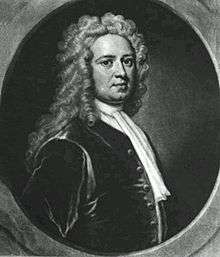 William Stukeley
William Stukeley Joseph Banks
Joseph Banks Alfred, Lord Tennyson
Alfred, Lord Tennyson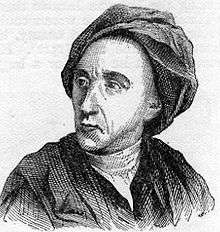 Alexander Pope
Alexander Pope Alexander Gordon
Alexander Gordon George Vertue
George Vertue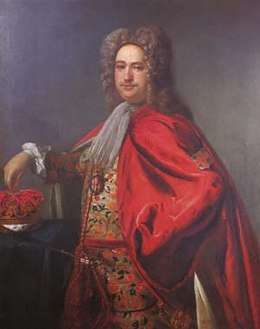 John Anstis
John Anstis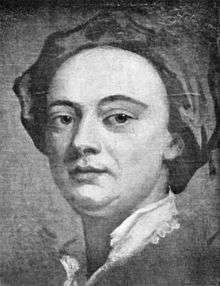 John Gay
John Gay Richard Bentley
Richard Bentley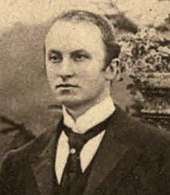 Lord Curzon
Lord Curzon
References
- http://www.spalding-gentlemens-society.org/the_museum_building.html
- "1710 – Spalding – Spalding Gentlemen's Society". History of Scholarly Societies. University of Waterloo. Retrieved 28 November 2010.
- Stukeley, William (2010). Rob Iliffe; Scott Mandelbrote (eds.). Memoirs of Sir Isaac Newton's life. William Stukeley 1752 (AHRC Newton Papers Project: transcript ed.). University of Sussex: The Newton Project. pp. Source: Ms. 142, The Royal Society Library, London.
- Brown, Iain Gordon. "Gordon, Alexander". Oxford Dictionary of National Biography (online ed.). Oxford University Press. doi:10.1093/ref:odnb/11021. (Subscription or UK public library membership required.)
- . Dictionary of National Biography. London: Smith, Elder & Co. 1885–1900.
Further reading
- D. and H. Honeybone with M. Chisholm (2019), Against the Odds: the survival of the Spalding Gentlemen's Society. Shaun Tyas for the Spalding Gentlemen's Society. ISBN 9781907730740
- Owen, Dorothy M.; Woodward, S.W., eds. (1981). The Minute-Books of The Spalding Gentlemen's Society, 1712-1755. Lincoln Record Society. 73. Fakenham.
- Honeybone, D.; Honeybone, M., eds. (2010). The Correspondence of the Spalding Gentlemen's Society, 1710-1761. Lincoln Record Society. 99. Woodbridge: Boydell. ISBN 9780901503879.
External links
- Official website
- Charity Commission. Spalding Gentlemen's Society, registered charity no. 216131.
- The Gentlemen's Society at Spalding: its origin and progress (1851) Bound with a catalogue of the society's library, 1893.